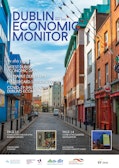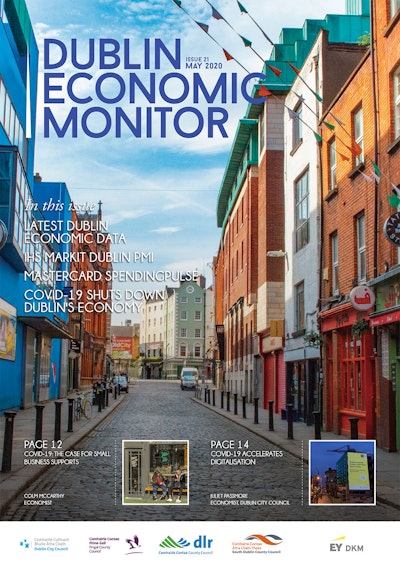The initial impact of COVID-19 on the Dublin economy is clearly evident in the latest Dublin Economic Monitor (DEM) published this morning by EY-DKM Economic Advisory on behalf of the four Dublin Local Authorities.
The data mainly covers Q1 2020 and captures the early part of the current economic contraction. That trend looks set to accelerate in Q2 when the full effects of the COVID-19 lock down become evident.
This economic deterioration is particularly apparent in the Dublin hotel sector where April occupancy rates (-57% YoY), Average Daily Rates (-30% YoY) and supply (-54% YoY) have all collapsed. Data from Dublin airport also reflects this with provisional numbers pointing to a 57% annual fall in March.
The broader business sector ground to a halt in Q1 with the Markit PMI index falling into contractionary territory for the first time in over seven years. This is apparent in the -4.7% yoy fall in volumes at Dublin Port in Q1, the largest decline since Q3 2009. This also looks set to accelerate in Q2 with the new orders componenet of the PMI, a leading indicator, decreasing for the first time since Q3 2012.
While the official unemployment rate in the capital only rose marginally to 4.6% in Q1, a sharp increase is expected in Q2 in line with the national COVID-adjusted unemployment rate, which rose to 28.2% in April (NSA).
Commenting on the report’s findings, David McNamara, Director with EY-DKM Economic Advisory, said:
“Q1 2020 marked the end of nearly eight years of uninterrupted growth in the Dublin economy. In that period, unemployment in the city fell from a peak of 13.7% in 2012 to a trough of 4.5% in Q4 2019 as the local economy boomed.
The COVID-19 crisis has reversed much of this progress in a matter of weeks. Private sector employment was already contracting in the city in Q1, with worse to come in Q2. There are now question marks over the viability of many firms and jobs when emergency income supports are withdrawn.
As Ireland begins the slow process of re-opening the economy, attention will turn to the post-COVID landscape and what changes might occur from the crisis. As was the case in the aftermath of the last recession, Dublin should recover at a faster pace than the rest of the country due to its industry mix of domestic services firms and multinationals, but most forecasters are now discounting any prospect of a ‘V-shaped’ recovery.
Jobs might be permanently lost in tourism and retail in the city, while a shift towards remote working in other sectors could change the way citizens travel and socialise in the city. As we emerge from the crisis, the Dublin Economic Monitor will continue to be a vital resource to track these changes and the city’s progress in the aftermath of the crisis.”
Mastercard SpendingPulse™ data sees tourist spending ease
The Mastercard SpendingPulse™, published as part of the DEM, also shows the effect that the lockdown is having on consumer spending in Dublin as shops closed and travel restrictions were introduced at the end of March 2020. The diverging patterns between necessity (+5.1% YoY) and discretionary spending (-5.1% YoY) were striking as consumers stockpiled essentials but were more cautious elsewhere. The likelihood is that spending on necessities will return to more normal levels. Unsurprisingly online sales accelerated in Dublin (+10.7% YoY) as the closure of physical shops saw customers move online.
Tourist spending in the capital also showed the effect of travel restrictions with all international nationalities measured showing annual declines except the UK, which rose by 1.3% YoY. Declines from the USA (-14% YoY) and France (-16.4% YoY) were particularly stark.
Michael McNamara, Global Head of SpendingPulse, Mastercard, said on consumer spending:
“Mirroring patterns seen internationally, spending on essentials at the end of Q1 contrasted sharply with declines in discretionary expenditure. Stockpiling Necessities and Household Goods ahead of restrictions helped offset the largest YoY contraction in Entertainment expenditure since 2014. Meanwhile, online sales have gained momentum, a trend that looks set to continue.”


